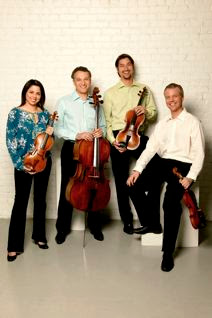Pacifica Quartet recording extends the legacy of Leo Ornstein with two of his large-scale chamber-music works
 |
| Simin Ganatra and Sibbi Bernhardsson, violins; Masumi Per Rostad, viola; Brandon Vamos, cello |
One such period was the first decade of the 20th century, when fitful campaigns to harass Russian Jews produced exiles of the kind known best to Americans through the hit musical "Fiddler on the Roof." Such a threat forced the immigration to America of Leo Ornstein and his family in 1906 or 1907. The future composer-pianist-teacher lived a long life in his adopted homeland, dying in 2002 at the age of 108.
In his youth a piano prodigy, Ornstein was known mainly as a concert artist into the 1920s, but gradually withdrew from the limelight and went into relative obscurity. That affected the public status of his compositions as well, including works that gained him an initial reputation as a futurist and an apostle of everything modern in music.
 |
| Marc-Andre Hamelin is right for Ornstein |
The first recording of Ornstein music wasn't made until 1975, supported by an award given by the National Institute of Arts and Letters. Besides "Moods," a short three-part suite for solo piano, the LP is taken up with the quintet. The performance is from manuscript, an indication of the long twilight Ornstein's music suffered. He was not idle, however. As a pedagogue, he and his wife founded a music school in Philadelphia; among the musicians who studied there, in 1944-45, was the future jazz saxophone titan John Coltrane.
The new recording reflects a more settled virtuosity than the premiere account, as worthy as that is for its energy and lyrical control. The Pacifica and Hamelin are unwearyingly attentive to the variety of turbulence and soaring lyricism in the quintet, especially in the first movement, "Allegro barbaro." Fierce and unhinged as much of the score sounds, it keeps wanting to sing, largely in the Russian manner.
The second movement, Andante lamentoso, is a brooding gem. It's warmly played here, with great arching lines, descending at length into a lovely, long fade. The finale picks up some of the first movement's energy, deployed with almost Siberian expansiveness. As with Ornstein's early music, the quintet abounds in impulsive vigor. A performance like this one requires sustained emotional commitment as well as sheer stamina. These musicians have those qualities in abundance.
The slightly later String Quartet No. 2 is somewhat less interesting. High-flying violin melodies are set over a texture that relies more on atmosphere than substance. The slow movement keeps the intensity going, but with banked fires, and its material is less involving than the music in the corresponding movement of the quintet. The expressive variety characteristic of Ornstein in these two works suffers more arbitrary interruptions, it seems to me, in the quartet.
Nonetheless, this is a remarkable release honoring a composer with his own voice — one that recalled the Russian homeland vividly yet without nostalgia, one that spoke of the new homeland's thrusting ambition and the American idea, since quite tarnished, that good things will come to those with free imaginations who seize the day.



Comments
Post a Comment